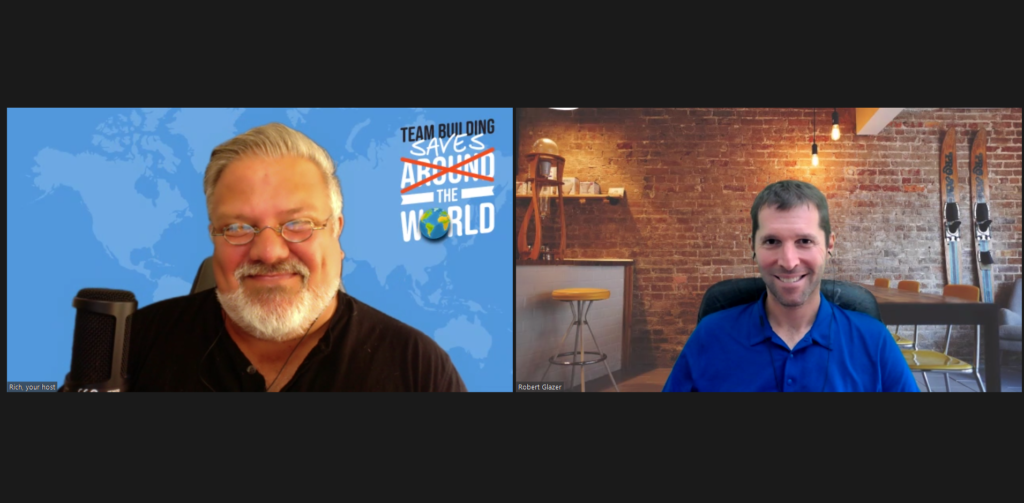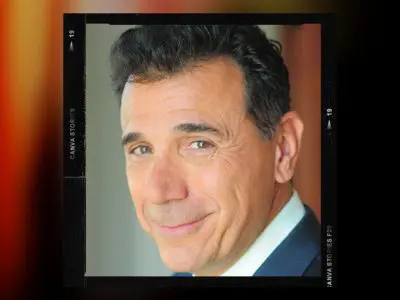The Great Resignation
w/ Robert Glazer
Use the buttons above to listen now.
Transcript - The Great Resignation
Rich: On this episode of team building saves the world. What’s causing them to actually now say I’m done with this and I want to move.
Robert: Yeah. So I think it comes back to that three things. The teacher wants to be the marketer. The marketer wants to be the fireman. The fireman wants to be the teacher. Like it’s just a lot of companies are choosing.
I think hybrid is the most dangerous, but will be the most common because now you’re creating two different classes of citizens.
Rich: Exactly. We don’t know where we are. Yeah. Oh, we still want
Robert: people are asking these questions. I really don’t. I think.
Rich: Hello team. It’s me, your old friend,Rich Rininsland host of team building saves the world. The show where I speak to the leaders and innovators of the team building industry from all across the globe, trying to find out what about that industry is so important, especially in the world of today. And today we’re talking about the great resignation with entrepreneur and best-selling author.
Robert Glazer. The first I need to share some love with my supporters at team bonding. If your team is you ready to experience teamwork through the power of play and visit team bonding.com to learn. Now team, the labor department estimated that a record 4 million people have left their jobs in April of this year alone, placing job vacancy in a 20 year high and creating what has come to be known as the great resignation.
Helping us to further understand the hows and whys of this historic event is the best-selling author of such books as elevate Friday forward and how to thrive in the virtual workplace, as well as being the founder and CEO of acceleration partners, a global partner marketing agency that has won over 30 awards for its approach to company culture is Mr.
Robert Glazer, show him some love my team.
Rob that applause is just a handful of people. I keep trapped under my desk just to meet you. How are you? My friend? Welcome. Thank you so much for coming on today.
Robert: I’m good. How are you Rich?
Rich: Excellent. Let’s start off. Uh, just, if you can tell my people out there exactly who you are and how you came to be involved in, in this area.
Robert: Yeah. So my day job is founder and CEO of a global partner marketing agency called acceleration partners. We have about 240 people around the world. We’ve been fully remote for 14 years. Uh, we’ve done some things differently along the way, and that led me to write about them and talk about them and develop.
Uh, moonlighting career doing some writing and speaking. So that’s, that’s my night and weekend job.
Rich: The great resignation. Can you tell us a little bit about it? Like define it and tell us how this actually started.
Robert: Yeah. So it’s real and look, a lot of times, you know, the prognosticators, is that the right word?
You know, when, who, who say these things are wrong? I think in this case they were really right. You know, next year, last year we had a six month period where no one left their job and switched their job. And, um, so there was just this pent up demand of where there would have been natural turnover. And then once liquidity came back to the job market, it was going to be a lot of turnover.
And I think it’s really exceeded anyone’s expectations. You know, there’s been a ton of money pumped into the market. Everyone’s looking for talent at the same time. You have people. You know, having, uh, I think it’s sort of three factors. You’ve got, you know, some companies kind of going crazy after talent in the market, too.
People just who are burnt out in the last 18 months. And I think mistakenly a lot of them think that just changing the job is going to fix the problem that didn’t have to do with the job. And there are some people over the last year that said, you know, had some deep moments and said, look, I, this is not what I want to do.
And I really actually want to do something different. And, and so I think companies are seeing all of that at once. And yeah, if the numbers continued at the current pace, it’s something like 30 to 35% of the entire. Job force would change jobs this year, um, which is an astronomical and record number.
Rich: So if we all look back, we all remember the beginning of the pandemic where people were losing jobs left.
Robert: Yeah. And no one was going to go take a new job. I mean, no one, you just were happy to have your job, so right. But then no one wanted to be last in either. That’s not, you know, that’s not sure, sure. Good place to be.
Rich: Yeah. Yeah. But then people started to pivot. The company started to pivot to the virtual global market.
And then folks were finding that they had the work available. What’s causing them to actually now say I’m done with this and I want to move on.
Robert: Yeah. So I think it comes back to that three things. I think also a lot of people liked the flexibility of work and, and, and their work environment could be going back to all in person.
It could be going to hybrid. It could be going to fully remote and, and they may not want to do whatever their company is choosing. I think recruiters are calling them, you know, non-stop like three, four calls a week, you know, you get thrown. 20 or 30% over your salary enough, you know, and then you start to take a look cause people are desperate right now.
But I said, I think it’s those other two buckets. I think it’s it’s okay. I made it through the other side. I’m a teacher. I don’t want to be a teacher. I want to be a marketer. I’m a marketer. I don’t wanna be a marketer. I want to be a teacher. I think there’s a little bit of that going on. And then, like I said, the bucket that sort of worries me.
I think people are associated. Look, some people have been in bad companies in the last year that didn’t treat them well or whatever some did. And you know, they, they weren’t good companies, but there was a lot of work and it was stressful. Most of the stress in the last 18 months did not have to do with the work it had to do with the fact that you had to be working across a global pandemic.
So I do see this grass is greener thing where people are just assuming that the thing, the other thing is bad. And, and by going to that new company, it’ll wipe out the memory of the last 18 months of working through a pandemic. I just don’t think that’s the answer. I think if you’re, if you’re going to do something different or you, again, you decided that you’re in a career that doesn’t fulfill, you want to make a fundamental change.
I think that makes a lot of sense. I think not separating the fact. It was a difficult year from you worked at a business that was good. And you know, it was busy. I mean, there’s no doubt that anyone work had to work through the pandemic in the last year was stressed in their role, but, but he find his irony of everyone switching, thinking that that’s going to fix the problem.
I just don’t. I think that’s a little misguided.
Rich: We’re also finding a multitude of other issues. For example, the, along with the great resignation, we’re seeing the great migration. Where a lot of folks, especially those folks who were living in, you know, very close to cities so they can be closed. Once the pandemic struck, finding themselves, wanting to get out of there either for fear of the pandemic or to be
Robert: close to it, call him back into the office.
And they’re like, I don’t want to go back in the office. I’ve been productive for a year at home. So there, there, there, there are a lot of factors. Okay.
Rich: So what are some of the consequences that we’re going to be seeing because of this?
Robert: I think we’re going to see some of regret. Um, look, I think I, as I say to people all the time and we have an open policy, if you want to leave and we’ll help you, but look, there’s some recruiters under pressure right now.
Recruiters are marketers. They are selling you. You know, I’ve generally heard a lot of people express that they were looking for a job that is less work and more pay me too. Me too. Exactly. Right there with you, right? So, but you got to understand recruiters are marketers. They are under a lot of pressure to fill seats right now.
They are they’re gyrus is like pledging versus rush. If you’ve done a fraternity or sorority. So they’re selling you the dream. And it just, it sounds great after a really difficult year, but I then when they tell you that they need you to start in four days and you can’t even give two weeks notice, I think that should be a tip off that you’re not walking into.
Island of serenity that you might have been sold.
Rich: You’re a CEO. Let’s look at it from a corporate point of view. We know how expensive it is. For companies to try to fill positions. What else are we seeing as part, because from what I’ve been reading with the great resignation, the problem, isn’t just that these people are leaving their jobs.
The problem is nobody seems to want to fill the position they’re vacant.
Robert: Yeah. So the job market is extremely tight in everything from digital marketing, the hospitality or otherwise. So if you lose someone it’s hard to replace them. It is a very tight market out there. But look, you got to understand most businesses don’t have, I mean, it depends on how much of your costs are people costs, right?
So we’re professional services. Like if people in the market want to start throwing 30% more to everyone that works at us, we can’t match that. Right. We can’t just, we can’t just react to that. Or we crush our margins and make no money and be out of business. So I think you’ve gotta be smart and measured with your response.
Just want more money will always move for more money. Right? So I think it is important that you are clear on the value proposition. Look, some of these clients that are companies that are hiring like crazy and throwing crazy things, they’re the ones that were laying off 30% of their people, you know, nine months ago.
So I think in six months as this plays out, you’ll actually see some people going back to their old companies and realize the grass isn’t greener and you’ll see people that were happy and, and made a move. But. There’s something I can’t get over it. And seeing that, like the teacher wants to be the marketer.
The marketer wants to be the fireman and the fireman wants to be the teacher just like it. Some of it’s just reeks as the grass is greener, not there’s a fundamental, good reason to make a change. A lot of people in the last 10 years have been able to move into new jobs. It’s been a Goldilocks economy except for three months kind of keep going and not seen a recession and move on.
And people have worked in a bad culture. Are the ones that, you know, say, look, it’s not worth taking a new job for a $5,000 more. I, so, so, you know, we find that people that have been in negative experiences understand that it’s not just about the money. People who have this has been a Goldilocks. Kind of tenure economy, right?
You could move to the next job, move to the next job. If anything was difficult, you could just get another job. It didn’t, you know, there’s no sense of burning your bridges or, you know, being a job hopper that hasn’t worked against anyone except for that three month period when it got scary last year. Um, initially, um, but, but I found that people who have been in a bad company or a bad culture, Uh, understand the cost of that.
And if they find a place that they like and are good work and otherwise they are, they’re not going to leave because someone offers them five or $10,000 more. I think the people who haven’t experienced that maybe are the ones who get intrigued, oh, they’re offering me the promotion or offer me whoever.
Like that’s what we found that the people who have seen the other side, if you’ve ever. If for a toxic company, culture or demotivating boss where you are just, you know, you’re feeling that Monday morning high school feeling like every time you have to go to work, like it’s not the, the, the money piece of it’s not, not everything.
And I, and I think, you know, some people will probably realize that over the next three to six months..
Rich: Well, why, so, I mean, what are some of the consequences do you think they’re going to see
Robert: I just think they’re going to see that they, they got sold as the grass is greener, still needs to be watered and isn’t better.
And, and, and I actually understand that people who have said I’m super stressed from the last couple of years, the year I’m burnout, I am going to take three or six months off, and then I’m going to look for a new job. Like that makes more sense to me that I’m burnt and stressed in the last couple of years.
So I’m going to take a new, I’m going to take a new job right now because to me a new job is actually a period when you need it. Ramp up and exceed the expectations. And I just, I think if they think that just switching jobs was going to make the last 18 months go away, they’re going to be disappointed that, that, that it’s not, I mean, again, like I said, I actually really more understand the people who are switching careers who say, look, I’m just taking six months off on burnout.
Like if you’re burned out from COVID changing, your job is not necessarily make COVID go away anytime soon.
Rich: Yeah. Looking at those people who think that this is a method of, or a time where they can actually make that change for themselves. Because I was reading a lot of reports where there are people who are just saying, like you had said, the hospitality industry has been way laid by the pandemic.
I mean, who wanted to go stay at a hotel, you know, over the, over the past year, except unless you absolutely needed. But now those people, now that we’re seeing a bit of reopening a bit of coming back to the way things were, those people want to improve their staged. Is that not something that they should approach or do you think that they should just stay with the job they had and not, I don’t want to say, be grateful for it, but possibly try to improve themselves while still there.
Robert: To me, it’s like a two by two matrix. Do you like what you’re doing? Is it with good people, right? Or, and again, if the answer, so things have been, yes, but it’s been a hard 18 months. It’s been a hard 18 months everywhere. If you don’t like what you’re doing, if you don’t like the people you’re doing it with, or you decide that like you are in the wrong career, this has been a, you know, it takes these kind of being pushed off the cliff to make those decisions sometimes.
And that’s a, that’s a great reason to. Switch jobs, switch careers just as long as your ex expectations are. That’s a bad message. It’s going to be easier, but you don’t want to do what you’re doing anymore, or you don’t want to work with those people that you’re working with anymore. Um, so I, I think that, you know, that’s that to me versus again, I just, I know I’ve said this a few times, but I just, the rationale I’ve heard from some people is, look, if you were in the best business that did well, that was me.
Freezers for Pfizer, you know, vaccine in the last 12 months, they were working 24 hours a day in tough shifts. Like, I mean, no nurse working in a hospital or a doctor in a hospital wanted to do what they want to do, but sometimes there’s a job to be done. Now, the question is where people nice to you and where they, you know, respectful to you or whatever, just because it was hard if everyone quit everything, because it was hard, you know?
We’d be in a tough place. In fact, all the people I know who are incredibly successful, continued down the road, whether it was hard. You know, that, that to me is, again, if you. If you don’t like what you’re doing, you don’t like what you’re doing with, that’s a great reason to shift if you love what you’re doing, if you like what you’re doing with, but it’s just been hard.
I think if you think just changing it up is going to make it better. I, I’m just not sure you’re going to find what you’re looking for. I could be wrong. I, there was one study that came out from like monster. Absolutely ridiculous. It said 92% of people wanted to change jobs or thinking about changing jobs.
I mean that, if that was true, that would be endemic of what I was just saying to you. Like how could 90% of people think that the other job is better than the one that they have? Like, they’re all just trading places..
Rich: I’m really enjoying this conversation. Robert didn’t need you to hold on for me for just one quick second.
I need to step away and tell him all of my team about a company. I’m very proud to be a part of team bonding. Team bonding was founded over 20 years ago with one simple question. How can employees have a great time while fostering strong, authentic bonds between people who work together? They’ve created a catalog of innovative events using the power of play as a learning tool and tapping into the correlation of work and play.
From scavenger hunt to jeopardy and so much more the team bonding of activities live virtual and hybrid maximizes the impact of team building with an accent on fun. So visit team building.com today to schedule your event, team bonding, when you want seriously fun results. And we’re having a great conversation with Robert Glazer here about the great resignation of Robert.
I want to actually turn this a bit and look at it from a company’s point. Yeah. How can we keep our people from leaving? I mean, your company has earned over 30 awards. Yeah. For just your way of approaching corporate culture. What is it that you’re doing that keeps those people wanting to work?
Robert: Yeah. Look, we try to have a full value proposition from a, as a workplace, uh, in terms of both compensation, benefits, investing, training, how we get together, you know, I think, I think, you know, helping people grow and expand their careers, being a certain type of culture, we are not for everyone.
I always say like our job is to figure out the 2% of people. Aligned to our values, you know, and are, are good fit for how we work and aligned to our values of own it, embrace relationships and Excel and improves. I mean, what I, what I try to be proud of is to say, look, we are, what we think is what we do is what we say here.
We are not for everyone, but I think someone would come in and say, oh, I, you know, I’m a running back. And I just, I came into a passing team like this isn’t the right team for me, you know, not, not to say, oh, these guys are full of crap because we believe a certain set of things. We have a certain set of behaviors that we reward and we try to be consistent about that.
It is not, it is not for everyone. So, you know, we think we’re a really great place to work for the 2% of the people that really, you know, fit that profile. So we, one of the things we do is not try to be everything for everyone. Like we have people say, well, let’s change this and that. And let’s get offices.
I’m like, look, you need a different team. Like we’re gonna run the ball 40 times a game. If you’re a gun slinging, passer. Then where you’re not on this, isn’t the right team for you to be on. And we see that in sports, right. There’s different systems for different players. So I think we just try to be really consistent about all of those things.
Um, and in terms of, again, culture, values and incentives. Um, but, but we really do. Invest in our people. We try to grow with our people, but we’re also a high performance environment. So you got to like both of those things, you gotta like the high pressure and like that, I would say we have a high bar and we’re going to do everything we can to help you get over the bar.
But if you can’t get over the bar, someone’s not going to lower it for you. Right. That’s that that’s our culture.
Rich: When did you first realized that creating a corporate culture that was beneficial for the employee, as much as it is you, the employer was the way you needed it.
Robert: Yeah. It was about five years ago. This concept called capacity building, which was look, if we can invest in people holistically and help them just get better, we will build people who can continue to grow with our company.
And they should see those same benefits outside of work, in their personal life and their relationships. Because if your health is off at home, it’s off at work. If you can’t prioritize. So we thought that they were a lot of. General life and leadership skills that we can help people learn that again, would help build the leaders we want in the organization and would improve their lives outside of work.
And then that would be a win-win and that’s something we’ve been doing for awhile. And we, we train around that. I mean, we do a lot of training. That’s not around our core business. It is leadership and personal development training, and the goal is. Make people build their capacity or help people build their capacity.
Rich: Now you’re going mostly virtual though.
Robert: Um, we’ve been virtual for 14 years.
Rich: Wow. Okay. With 235 people globally, how are you then keeping in contact with your employees? How then are you maintaining your team while everybody gets to work from home?
Robert: I always say we’re a little like the Navy seals. So we’re in client services.
I think it’s kind of, or like the military and that. Yeah, the military, or if you’re in the army or whatever it has, its ethos is thing it’s training, but 90% of your work is in your, you know, command unit. Right? So I think our, our teams of eight or 10 do a lot of their work together, you know, do a lot of client facing stuff together.
They typically see each other a lot outside. COVID um, and then, you know, but they’re, but they share the same culture as the other teams and the same training and otherwise. So, you know, we’ve always just had, you know, robust onboarding program training programs. We view, always use video. A lot. Those teams are in touch a lot.
We are organized around specific cities. We just did. What’s called our hub city kind of two weeks where we were able to meet with the entire company might go into each hub and spending the day there as a leadership team. And, and we also do a, an all company event called AP summit for four days once a year.
And we go pretty deep at that after those four days. And I actually think that kind of depth can carry people pretty far throughout the year and is different than it might be in an office all day and never. You know, say any, say anything or learn anything about that person you work with more than sort of pleasantries.
Um, but you know, you’re at a retreat and you’re doing something that’s more, more deep and you might learn that, you know, had very similar childhood experiences or connections that you just didn’t even realize you had.
Rich: So is this something you would recommend to other types of businesses who are looking to retain them?
Robert: I, yeah, so we’ve always, it’s funny. We’ve never been like gung-ho. I used to get invited to speak at these remote conferences and it was just companies who were just like, we are remote and Deval vagabond. Ours was always. A culture of high flexibility and high accountability. Like I like that combination.
Right. And people who work for us, like the flexibility, they like to travel. They’re competitive athletes and they train, they have younger kids and they’re super, super accountable. So yeah. I mean, I do think the one thing that’s coming out, no matter what you choose is that I think employees are looking for more flexibility.
Like, I just think that. A rigid work environment is going to be attractive to fewer and fewer people. So you can offer that. But as mark Cuban has been saying this a lot with respect to cryptocurrency lately, supply and demand are undefeated, right? So if you are supplying something that no one wants, uh, then, then you’re going to find out pretty quickly that that’s not super effective.
Rich: Gotcha. What about, uh, I mean, speaking of somebody to somebody who works primarily virtually, how does somebody look forward to improving their station? If they’re mostly just being left to their own devices,
improving their.
Um, getting raised, getting a promotion, getting, you know, moving up,
Robert: They are not left to their own devices.
So, so I mean, everyone has a, a growth map and a growth plan. It’s very clear what the next level is. There’s constant leadership training. So like our onboarding program, I would tell you it’s probably better than 99% of all companies, because it has to be, you know, we can’t have people, how many companies are in-person let people show up and just say, Uh, Sarah.
Yeah, I forgot you were saying that. Why don’t you just follow around rich shadow rich this week, right? If you ever worked at a great company, you don’t have your desk until week three, you come in and they put you in customer service and then you go to the sales team and it’s all scripted out. We’ve done that for years.
So you start as a new employee. Your first two to three weeks are scripted out to the hour for three weeks because we have to, I can’t have you start at your computer and be like, yeah, I’m here. You know, what, what do I do? There are a lot of those things where, because we are not together everyday. I actually think we have more intentional systems and processes.
I think we have totally public KPIs and accountability charts on what everyone needs to get done in the quarter and the metrics and all that stuff.
Rich: But you’ve been doing this for 14 years now, long since, before we even knew what COVID was correct. How about a company? Has not been doing that pre COVID, but now thinks that this might be a kind of model they want to approach.
Would you recommend it?
Robert: I’d recommend them and they go back to their sort of cultural foundation and building blocks. So the most common thing I saw from companies who made the shift to remote work during COVID was they had good fundamental cultures. So let’s think about a culture that way. There was great KPIs, high trust, good leadership, not micromanagement, good communication.
And they suddenly had to work from home. Let’s think about another company where there’s a toxic culture. Tons of micromanagement, no trust, unclear KPIs. And they suddenly had to work from home. whose leader . Do you think are are going to be ? It’d be like, you know, dealing with that better. So I actually think it comes back to what’s the type of company you want to build.
What do you value? What do you reward? Um, some in some cultures may not work well in that environment, for example, like, we’re pretty honest, if you are. If you are someone who needs you are a consensus builder person. You’re probably not right for our culture. We are in a fast paced client service environment where people are working independently.
A lot of the times it requires a willingness and an interest in making decisions. Right or wrong, you know, with limited information, that’s just the, that’s the business that we’re in. If you need to ask eight people and come up with a consensus decision with everything you do, you’re not going to like that environment.
Like it’s just not, it’s not the right environment for you. Hmm.
Rich: Are you seeing that this is falling particularly along generational lines one way or the other, like for like, for example, uh, are the, you know, the greatest generation and the boomers who are still working in the marketplace, are they the ones who are adamant that people be coming back.
That you know, that buyer.
Robert: So they’re adamant, well, it depends on the industry, like in banking, they’re ordering people back and then cause they have leases and stuff. But generally I think the look you have this, the younger workers tend to live and work in cities. The older or mid-career workers tend to have.
Gone to the suburbs, but still drive back and commute to the city. Right? I think if you live in a 300 square foot apartment in New York, you probably want to go into the nice office building in New York. If you live in a 4,000 square foot house in Westchester. And it’s an hour and a half commute to New York.
You’d probably rather not drive in every day. So I do think that’s falling on career lines a little bit. I talked about this bridge closing. I think we’ve had this bridge forever where, you know, like I said, you started in the city, you live and work in the city. Live here, but work here and you commute. I think that’s closing because I think that people say, look the two to three hours a day of commuting.
Like I want to work in a city. I’ll live in the city and, and otherwise I want to live in a suburb. I’d rather work from that suburb. At least the majority of my time. I, you know, the stats are pretty crazy. Like, you know, the average person commute. An hour and a half a day, both ways it’s gone up a minute or two a year in the last decade.
And then the open office experiment was one of the worst things ever, you know, it’s been proven that all it does is cost distraction. So, so you’re spending longer time than ever to go to the office to be more distracted than anyone has ever been in an office before. And people are wondering why there weren’t getting a lot done and, or were surprised how much they got done.
Once they had to work remotely.
Rich: So people are trying to try to find the middle of the road to a largely hybrid method of doing this. You know, you work from home two days out of the week, three days out of the week, the rest of your in the office place, because we’re paying for the office space. Yeah. Uh, what kind of recommendations could you make for either the employee or employer in that way? To try to make hybridization a reality. Moving forward,
Robert: I have very strong recommendations for hybrid, and I talked about this in my book. I think that a lot of companies are choosing, I think hybrid is the most dangerous, but will be the most common. I say that because a lot of people are choosing hybrid as the absence of a real decision, which I think just is going to cause more confusion for everyone rather than as a strategy I have seen if hybrid is ice cream.
A hundred different flavors so far, and they’re all different. I’ve heard companies say, look, you can do whatever you want. That’s the sort of indecisive hybrid, because I think that leaves us a lot of ambiguity around meetings, promotions, get togethers, that stuff, right. I’ve seen companies say, you need to come in for 50% of the time.
I’ve seen companies say, you need to come in on Monday, you know, Wednesday and Thursday. And I’ve seen companies and say, you need to come in for these sorts of things. Like our sales meetings are like, these are all different approaches that need to be supported, and that will appeal differently to different people.
So if I moved to Vermont, like I, you know, from a New York company, like some of those may not work for me. And some of those may work for me. I, I McKinsey recently said I think the 40% of companies haven’t really declared that. Return to work strategy and 30% are so vague that employees don’t know what it means.
So this is 70% and it’s causing a lot of stress and anxiety. I think it is much better to say here’s our hybrid. And if you don’t like it, Go somewhere else and we’ll get the people that want it because like everything else in life, we try to be everything to everyone. I think you will lose more than if you be something, someone,
Rich: how honest are those recruiters actually being though Robert talking.
Cause like you said, they have to fulfill that quota. They’ve got to get pardon my French, butts in the seat
Robert: so, so we’ve had in talks with employees of ours because you know, we’ve been remote and known how to do this for over a decade. Some companies now are just offering this up. They’re calling people, they’re offering them great job time and make them roadwork.
We’re talking through with them. We’re like, look, are you the only remote person on that team? Does this company know it? Like it can be really isolating to be the only remote person on team when everyone else is in the office in California. Have they done this before they have experienced to me, this is part of this six month thing.
We’ll figure out where someone says, oh, you know what? Their remote was really different than our remote. Like we spent 10 years trying to figure out how to do this. Companies are just saying, look, you can work from wherever you want because they want to get the person, but I’m not sure that they have the system stuff to support.
I think it would be the only person on the wall, in a conference room every week for the key call. Like you might start to feel and they’re all out going out to dinner after work. Like I, I, I really do. That in six to 12 months, we’re going to start to see that the wheat and the chaff, like what, what separates it,
Rich: you’ve managed to with a snazzy recruiter, get someone to at least come online to do an interview.
When does the honesty of the situation come about? Like what would you recommend to a manager, CEO, CFO, or whoever’s hiring to actually say to the future possible employers? We don’t know where we are yet, but we still want asking these questions.
Robert: I really don’t. I think, yeah. Reverse due diligence. You should be asking about the values.
You should be asking about how this is going to look like. I mean, I, I, I’ve spoken for a bunch of companies, um, to their leadership teams who have not figured out their strategies and their companies have professional services here in the manufacturing facility here. And they’re a little bit, they’re like.
Okay. Had the salad. I’m like, you need to figure this out. Yeah. Yeah. You need to figure out what you’re gonna be telling people. I honestly don’t. I think people are, so I’m going say desperate, but, but this, this motivation to just do something different that the grass seems greener, that they’re not, I don’t think they are asking these questions.
Um, and I don’t think they are. You know, because I think then the answers would tell them, like, what does your remote look like? What does it, what does it mean? How long do I have to be in the office? What does the support look like? What percent of people are going to be in this bucket or otherwise I did a webinar yesterday and this company said it’s kind of funny.
They said our company started hiring. Remote people for our nonprofit, in other states who are fully remote, but they’ve told people in state that they can’t be fully remote and they have to come in the office. So how do you, how do you feel about that? And I was like, well, are they being asked to do different jobs or the people in state are they, like, you know, are the other people are accountants.
And the people in states are our partner development and they need to go out in the community and develop with partners. I mean, Is there an actual business justification because otherwise that makes absolutely no sense. That sounds like a mess. Like I, if it’s the same job, then why are you giving these people different rules?
You know, or you should say to those people, you got to come visit the office. I was like, I don’t understand that. And depending on the answer to that, if those jobs are exactly the same, I can imagine why those people would be annoyed because now you’re creating two different clubs, citizen.
Rich: Exactly. So I guess this is just going to be the big overall. Cause we’re talking about the next six months. What do you see?
Robert: This is the mess that we’re in a mess the way in is that right now we’re in the quagmire right now. There’s hasta. Like, can we make this work? Yeah. Get through it. Two companies should have been putting their flat look. I don’t agree with some of the companies that have said, look, we’re a hundred percent in the office.
There’s no flexibility. And that’s who we are. But I actually appreciate that. They’ve put their flag in the ground. I started one of the guy who was an insurance company. He said, look, leaders are supposed to make decisions with imperfect information. Sure. This is the decision we’re making. It might not make everyone happy, but I’m making it like I, and I, I agree with him.
I don’t, I don’t agree that they can’t put some flexibility in their culture. I actually agree for their businesses. People need to be in the office 80% of the time, but we’ll have you, you can have a flex day a week or whatever. Cause again, proving that it doesn’t wifi traffic at 4:00 PM on a Friday. If I can do that work, you know, at home in the afternoon and leave at 12 o’clock.
But I think a bunch of people are just being wussy. And again, it’s, it’s past the time to put your flag in the ground and say, this is what it’s going to look like at our organization. Barring any unsuspected thing that we can’t control.
Rich: What can help them? What kind of perks can they start building into their culture?
That’ll keep people
Robert: there according to them, like, is it just competence some cases? Is it team-building activities? Is it getting together? You know, are, you know, are there other things, I mean, you’re seeing a lot of companies offer up, uh, education benefits because I think they think that’s a good retention tool.
I think target and Walmart have said, now they’ll pay for your college, you know, while they’re there. So, so things that, you know, if people are investing in themselves, they’re likely to stay there throughout the duration. So look, people want to be invested in, I think there’s a lot of way to do that. Like we think our leadership training programs are really motivating for people to stay.
I think that’s why they’re doing the extended education programs, but that’s, that’s one thing that we’re seeing a lot of
Rich: just to quickly broach the topic. I haven’t even touched on before with any of my other previous episodes. What might unions in all of this?
Robert: Yeah, it hasn’t come up a lot for me. I, I.
It’d be interesting because I think unions tend to represent businesses that are more trade oriented and therefore almost have to be in person. Right. If you think about like hotel workers or airplane workers or mechanics or electricians, right. I mean, It’s probably aren’t people have the choice to be remote.
So there may be less of a discussion there. I’m sure there’s all kinds of stuff going on around vaccines and stuff. But, uh, that, that’s interesting. I haven’t, I haven’t thought a lot about that. I, I, I’m seeing more, this is happening more, the decision, probably more than non-unionized industries. Again, everyone just went home and was able to do their job totally from home.
Rich: Give me a best case scenario for the next two years. Robert, what do we think we’re looking at? I mean, is the dust eventually going to settle or is this going to take longer than we get over?
Robert: In terms of the great resignation sort of working its way through? It’ll be interesting because I, if it keeps going on this long, then you’re going to have the six months of stories where people can tell them, Hey, look, it is better on the other side or it isn’t.
So I think you’ll start having a feedback loop. I do think also there is so much. Artificial stimulus pumped into the economy right now that we’re very likely to have that unwind and there to be a mild recession or a pretty deep cooling off, um, which shifts this power. I always let you know, Warren Buffett, I think, or Charlie Munger has number two.
I said that the cure for high prices is high prices. Um, and, and, and, and somehow those things always sort themselves out. So I think by the end of this year, it’ll be interesting. Well, we’ve gotten through this first wave and either. You know, the, the word’s going to come back that it’s not better on the other side.
And there’s a lot of regret and, you know, people, those jobs don’t work out or. It is better on the other side, come, come over to our side of the water and we might have a second wave and look, I think it all depends on Delta right now. I think right now you’re seeing now all the restaurants and airlines and a lot of the ones who are trying to ramp up labor now are saying, you know, and that’ll be bad.
So we’ll see. It’s just, it’s just, it’s a weird time because there’s so much artificial money being pumped into the economy that right now there are more job openings than people. So that’ll have to sort itself out one way.
Rich: So as a successful CEO, yourself, any recommendations you can give. To both the corporate side and the employee side.
Robert: Yeah. I, I think both sides should kind of consult their values. Pick what’s important to them. Communicate, honestly, pick a value proposition and understand that you’re going to lose. If you’re the employee that might, you know, you’re going to lose some companies because of that, that aren’t a fan of the company you’re going to lose some employees.
Like I said, I think it’s better off to. Tell your employees, the truth about your go-forward model, maybe lose 30% of those people, but get the 30% who said, oh, my company got rid of the office and I want to go back to one. So I’m coming to work through there then kind of making everyone mildly satisfied.
I think it’s time for people to start getting, showing their hands. Explaining they have, you have a unique opportunity to put a value proposition out there and get the people that attracted it. Look, we want people who want to be in the office on Monday, Tuesday, and Thursday, because we think that’s really important.
Other company might say, look, we want people who get results and we don’t care when you’re in the office. And in other ones, they look, we want people who want to be in the office, but it’s, we’re not going to prescribe the days. But look, part of our value prop is that you want to get together with your colleagues and do these steps.
So you actually have an opportunity. Pick a strategy that, that differentiates. And I think that’s the, that, that’s kind of where we are.
Rich: Gentlemen, please give another big round of applause for Robert Glazer,
Rob again, thank you so much for coming on board. This was a fantastic conversation, high energy. I loved it. I hope. Because I’m going to, I’m going to put you a little bit on the hot seat. Now. It’s time for my speed round.
no amount of cheese was left, unturned it Robert, once again, just to explain to you Robert, how this works, I am going to be going through 60 seconds of quiet. Your objective is try to answer as many of them as you can. And the objective here just right off the top of your head, don’t think, just answer.
That’s the fun of this. Okay. And we’ll see what we can get through in 60 seconds together. If you’re feeling competitive at all, if that’s in your nature, the number to beat 13.
Robert: 13. Wow. Well, you know, it wasn’t a Friday afternoon before happy hour. Maybe I’d be more on the Monday morning. Caffeinated would probably would have been a better, oh,
Rich: Or I could call you back after happy hour, we can see how well you do then we can sort of compare and contrast.
Robert: Perfect.
Rich: All right, Robert, hold on here. Once you hear the music, I’ll start asking questions. And away we go. What’s your name?
Robert: Robert Glazer.
Rich: How many children do you have?
Robert: Three.
Rich: Which one’s your favorite?
Robert: The middle one.
Rich: Hey, somebody actually answered. Who would you like to see play you in the movie of your life?
Robert: Uh, George Clooney.
Rich: Nice. Uh, what does that great book you have read recently?
Robert: Uh Sabians
Rich: if you could eat only one food for the rest of your life, what would it be?
Robert: Pizza.
Rich: What is the one thing you remember learning from kindergarten?
Robert: Uh, how to write keep out girls?
Rich: Would you rather live for a week in the past or the future
Robert: future?
Rich: What’s one choice you really regret,
Robert: uh, not deciding things sooner.
Rich: Favorite holiday, vacation,
Robert: uh, skiing.
Rich: If you could live in any state, which one would you like to live in
Robert: Utah?
Rich: What’s the most outrageous thing you’ve ever done
Robert: by Bob sledding this weekend.
Rich: Excellent.
Well done. Are you ready for this? Do you.
Robert: Yeah, 11,
Rich: 12,
Robert: 12, just in case my kids are watching my, my, my middle child. I love my child and equally, but my other children accuse me of savoring the middle ones. Okay.
Rich: So you were just giving them the reality
Robert: . I was just going with that. Yes.
Rich: Fantastic. Robert, please. Can you tell my team out there where they can find you or the books that you’ve written
Robert: last of the books?
My Friday Ford newsletter courses, everything is at Robert Glazer, G L a Z E r.com. Fantastic.
Rich: Thank you so much. And thank you team. Guess what once again, that wraps up another episode of team building saves the world. Thank you so much for coming on board. If you like this podcast, please remember to actually share it with your friends or colleagues or anyone you think who might be interested in this topic, which is certainly a fascinating topic.
You can find us on all the social media is a team bond podcast, and of course@theteambonding.com forward slash podcast, where you can find this and all of our past and future episodes. Until next time, my friends, please always remember no matter where you are, if you are within the sound of my voice, now, you were always on my team and I will always be on yours.
So from all of us from team building saves the world to all of you. You guys have a great day and I’ll see you next time.
It’s been said that you learn more about a person in an hour of play than in a year of conversation. So why not put your coworkers to play with the help? The team at team bonding team bonding was founded over 20 years ago with one simple question. How can employees have a great time while fostering strong, authentic bonds between people who work together?
Their catalog of innovative events include scavenger hunt, jeopardy, and much more each activity, whether it. Virtual or hybrid maximizes the impact of team building with an accent on fun. Visit team bonding.com to schedule your event now, team bonding. When you want seriously fun results.
September 20, 2021
Is the grass really greener on the other side?
Right now, there is an unprecedented number of people leaving their current jobs. The pandemic has caused a lot of employees to change their mindset on when and where they want to work and seek out positions that are more flexible and will bring them more happiness. Employers on the other hand are trying to keep up with these changes while tending to their businesses needs. This week we speak with Robert Glazer from Acceleration Partners on what has been dubbed the Great Resignation. Robert talks about what he thinks are some of the reasons for the large turnover and when things may level out.
Robert Glazer is the founder and CEO of Acceleration Partners, a global partner marketing agency and the recipient of numerous industry and company culture awards, including Glassdoor’s Employees’ Choice Awards two years in a row. He is the author of the inspirational newsletter Friday Forward, and the #1 Wall Street Journal, USA Today, and international bestselling author of four books: Elevate, Friday Forward, How To Thrive In The Virtual Workplace, and Performance Partnerships. He is a sought-after speaker by companies and organizations around the world and is the host of The Elevate Podcast.
" McKinsey recently said I think the 40% of companies haven't declared their return to work strategy and 30% are so vague that employees don't know what it means. So this is 70% and it's causing a lot of stress and anxiety."- Robert Glazer
Get more human resources and leadership advice.
Less drama? Greater teamwork and job satisfaction? TeamBonding is here to help you build a stronger and happier team. Subscribe to get our team building podcast and thought leadership blogs sent straight to your inbox.















